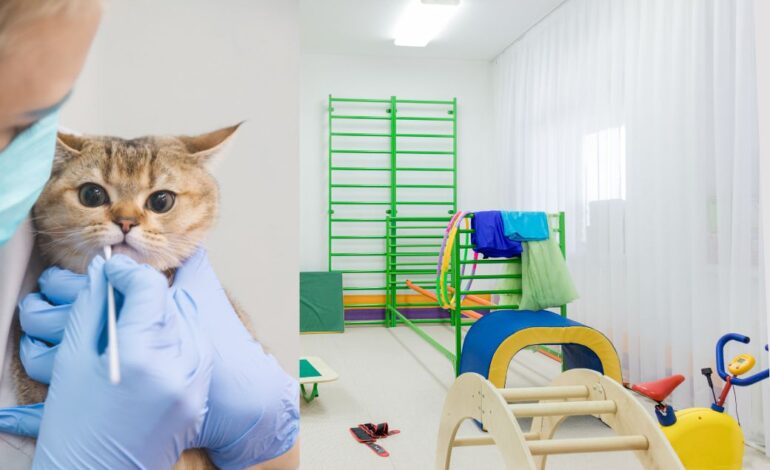
Integrative Pet Health: Blend of Traditional & Alternative Care
Looking after a pet’s health can be puzzling. What is the best way? Traditional vet visits are vital. But extra steps promote well-being, too. Blending customary care and alternative medicine tailors care to your pet’s needs. This combined approach is called integrative health.
The goal of integrative pet health is straightforward – help pets stay happy and well! It unites science-based vet medicine with complementary therapies. Each pet gets treatment for specific issues. Plus, support for overall vitality. Custom care improves the quality of life. It relates to physical, emotional and mental health.
This lets paws, claws and tails thrive! Holistic well-being prevents illness too. It enables pets to bounce back from injuries and sickness. Integrative care is a friendly, fuss-free path to fitness. It gently boosts the mind and body. Your pet benefits from the best of both worlds – traditional and alternative. United enhances health from the inside out.
Traditional Veterinary Medicine
The vet clinic is a crucial stop for all pet owners. Standard veterinary care helps keep our furry friends happy and healthy. Regular checkups allow vets to catch problems early. Regular checkups allow vets to catch problems early. When illness does strike, conventional medicine offers proven treatments.
Common vet services like:
- Exams and lab testing to diagnose issues
- Prescription medications to treat infections, diabetes, arthritis, etc.
- Surgeries for issues like ACL tears or blocked cat bladders
- Dental cleanings to prevent gum disease
Traditional medicine remains essential for managing both acute and chronic pet health problems. It gives vets the tools to fix many common ailments. However, some pet owners find that standard care isn’t enough on its own. This is why many are now exploring complementary therapies as well.
Integrative care combines the best of both worlds. Alternative options then provide extra support for a pet’s total mind and body wellness.
Alternative Medicine Options for Pets
Along with regular vet visits, many pet owners now also try alternative therapies. These natural, drug-free healing methods can boost overall wellness. Things like acupuncture, chiropractic adjustments and herbal remedies work well with standard medicine.
Some popular holistic treatments are:
- Acupuncture to help the body heal and ease pain
- Massage to relax sore muscles and joints
- Aromatherapy using calming essential oils
- Homoeopathy customized to symptoms
- Herbal medicine to support organs
The aim is to support the whole body and its natural healing power. These gentle options can help pets relax, feel better and get back in balance.
Vet bills and meds cost a lot. To get money to pay medical bills, owners often add affordable complementary medicine. Integrative care blends the best of both worlds. Pets benefit from regular vet diagnostics, treatment, and holistic therapies for optimal health.
Nutritional Therapy and Supplements
Diet plays a significant role in pet health. The right food can prevent or manage many illnesses. That’s why integrative vets often recommend nutritional therapy. This uses customized diets and natural supplements.
Certain foods or add-ins can target specific needs:
- Omega fatty acids reduce inflammation
- Probiotics and digestive issues
- Joint supplements ease arthritis
A vet nutritionist can tailor your pet’s diet. For example, some breeds are prone to allergies or bladder stones. Special foods can prevent these issues. Diabetic pets may get a low-carb recipe. Kidney diets lower phosphorus.
Supplements also support wellness. Glucosamine keeps joints fluid. Antioxidants fight ageing. Herbal mixes can calm anxious pets. Always check with your vet before giving supplements. Track how your pet responds.
Nutrition is preventive care. With the right ingredients, food can be medicine. It offers easy, affordable options alongside traditional treatment. An integrative plan includes therapeutic diets and supplements to complement veterinary medicine. The goal is total mind and body wellness.
Physical Therapy and Rehabilitation
Like people, pets can benefit from rehab after injuries or surgery. These therapies help pets move better and feel good again. They also aid pets with arthritis, pain or other ongoing issues.
Some common techniques are:
- Massage to relax sore muscles
- Stretches and exercises for range of motion
- Walking on an underwater treadmill for low-impact activity
Canine physical therapy uses many of the same methods as human PT. Pets do special exercises to rebuild strength and balance. Therapists make custom plans for each patient. They help pets safely regain mobility step-by-step.
Rehab costs a lot, and vet bills can really pile up. To get money to pay medical bills, many owners use pet insurance. This makes therapies more affordable after injuries. An integrative plan includes rehab with regular vet care. Physical therapy helps pets heal better and keeps their bodies nimble. It’s a balanced approach for optimal health and comfort.
Integrating Traditional and Alternative Care
Blending standard and holistic medicine takes planning, but can give pets the best of both.
Tips to make it work:
- Find a vet open to alternative therapies
- Discuss any supplements or therapies you try
- Ask your vet to coordinate between providers
- Track progress in detail
- Go slowly adding new therapies – watch for reactions
- Give each treatment time before switching gears
Integrative vets mix conventional and complementary care. They use standard testing to make a treatment plan. Then they add natural supplements, diet changes, rehab and more.
An integrative vet manages your pet’s whole health team. They coordinate care across specialists for safety. Check credentials when finding a holistic practitioner. Work together to give your pet comprehensive support.
An open partnership between you and your vet helps integrative medicine thrive. Combining systems this way draws on their strengths. Your pet benefits from the best of both worlds.
Conclusion
More and more pet owners are looking into integrative care for their furry friends. This means mixing traditional vet medicine with natural therapies. The goal is to give pets a balanced way to stay healthy and feel good.
Instead of taking your dog to the yearly checkup and shots, you could bring him to canine massage or acupuncture. You might try calming herbs, supplements, and her regular diet for an anxious cat. Integrative health uses a combo of standard and holistic care.
The regular vet practices we know are still vital. But alternative medicine can also boost wellness. Chiropractic care, essential oils, and Chinese medicine offer extra benefits. An integrative plan looks at the whole patient – mind, body and spirit. More pet owners are seeing the perks of this blended approach.
For more authentic information about pets solutions, visit Vortexpedia.








